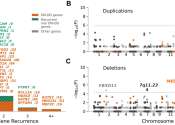The Wellcome Trust Sanger Institute was formed in 1992 for the purposes of funding biomedical research. Specifically genome sequencing efforts. It is the largest charity in the U.K., and receives a majority of its funds from the Wellcome Trust. The Institute is responsible for the completion of the sequencing of approximately 1/3 of the human genome and model genomes of the mouse and zebrafish and more than 90 pathogen genomes. Today, the Wellcome Trust Sanger Institute has been able to attract top scientists and has more than 30 Senior Researchers on staff. The Institute is located in Hinxton, Cambridge, U.K., and spends approximately 650 British Pounds annually to support relevant research by preeminent scientists and labs around the globe. The Institute supports work at the University of Nottingham, MIT, University of Toronto, University of Gothenburg, University of Manchester and other institutions of higher learning research labs.
- Address
- Hinxton, Cambs, CB10 1SA, UK
- Website
- http://www.sanger.ac.uk/
- Wikipedia
- http://en.wikipedia.org/wiki/Wellcome_Trust_Sanger_Institute
Some content from Wikipedia,
licensed under CC BY-SA
Subscribe to rss feed









